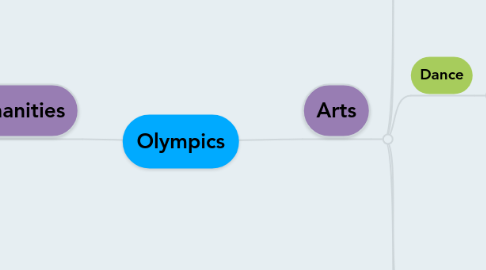
1. Humanities
1.1. Geography
1.1.1. A mapping exercises where the students have to map all the cities that have held an Olympic games.
1.1.2. Do a mapping exercises using the maps from the classroom's country. Get the students to identifying a border, scale, legend, title, north point and source.
1.1.3. Research a country that participates in the Olympics
1.1.3.1. Demographic, economic, social and cultural characteristics - compare to Australia.
1.1.4. Map the location of each of the sporting events in Rio 2016.
1.1.5. Each year 6 class focuses on a country and holds a cultural day where the class has to bring in different cuisines to share with various students across the cohort.
1.1.6. Research the national fauna and fauna of the classroom's country. Comment on the human impact to the environment.
1.1.7. Look at the journey of the torch across various countries to the lead up of the Rio 2016 games. Get the students to create and map their own route of the torch in around Australia. Students will need to explain why they chosen this specific towns for the torch to visit.
1.1.8. Look at the devastation of natural disasters of the classroom's country. What impact has it had on the country and its environment.
1.2. History
1.2.1. A timeline of the ancient and modern Olympics
1.2.2. Research a present or past athletic who has participated in the Olympics.
1.2.3. Conduct a research project on the ancient Olympics games in Greece.
1.2.4. Research the history of the sporting events in the modern and ancient Olympics.
1.2.5. Background of the modern Olympics
1.2.5.1. Summer and Winter Olympics
1.2.6. The students will study the language of the classroom's country.
1.2.7. Research the history behind the touch and flame.
1.2.8. Look at participation of men and women who are Aboriginals or Torres Strait Islanders in the Olympics over the years.
1.3. Civics & Citzenships
1.3.1. Students are to organise and hold a mini Olympics. Students will run a serious of events, administering rules and fines if it is required
1.3.2. Conduct an excursion to the visits the National Sport Museum or the Australian Institute of Sport.
1.3.3. Research political discourses surrounding the Olympics.
1.3.4. Research and learn about the political framework of the classroom's focus country.
1.3.4.1. Conduct a political session or meeting in regards to the political framework of the classroom's chosen country. You may get the students to elect a prime minister or president before giving students a topic or issue to discuss about.
1.3.5. Research the regulations and rules regarding the Olympics. Get students to create they own code of conduct for the classroom.
2. Arts
2.1. Music
2.1.1. Learn the national anthem of the classroom's country. Incorporate instruments.
2.1.2. Look at and learn cultural songs of the classroom's country.
2.1.3. Watch the opening and closing ceremony. Focus on the music that has been chosen
2.1.4. Create a new national chant for a the classroom's country.
2.1.5. Research any traditional instruments the country use in songs and cultural gathering
2.2. Visual Arts
2.2.1. Designing a flag for the classroom's country
2.2.2. Look at flags of the world
2.2.3. Decorate the room in their country's colours.
2.2.4. Design a countries uniform. by using the countries colours.
2.2.5. Design a mascot for a particular country
2.2.6. Create artwork which can be displayed in the players village. Incorporate a good luck message.
2.3. Dance
2.3.1. Learn various cultural and traditional dances of the classroom's country. The students will perform their dances at a whole school assembly.
2.3.2. Watch the performances of the opening and closing ceremonies.
2.3.2.1. Look at the meaning of each dance or performance within the ceremony. Discuss with the students what each performance is trying to represent or present.
2.3.3. Research the establishment and meaning behind some of the classroom country's traditional dances.
2.4. Drama
2.4.1. Conduct a mock medal ceremony
2.4.1.1. This could be incorporated with the mini Olympics.
2.4.1.2. Students could also build a medal platform and create various props.
2.4.2. Reenactments of events in slow motion.
2.4.3. Create a play about an athletics journey.
2.4.4. Students are to create they own opening or closing ceremony performance for the classroom's country. Must include a ray of performances that highlight the cultural of the country.
2.5. Media Arts
2.5.1. Create a timeline using photographs from Olympics through the ages
2.5.2. Collecting newspaper articles or magazines articles about the upcoming Olympics.
2.5.2.1. Students will place their articles on a massive news board located on one of the classroom walls.
2.5.3. Students can participate in the 'Chat to a Champ' program. The class can participate in a web chat with their Olympic hero.
2.5.4. Create a mock interview with a Olympic athlete. The students will record and present their videos to the class.
2.5.5. Look at various ways of how the media is reporting the build up of and running of the games.
2.5.5.1. Look at the different forms of media that is being used to communicate meaning and viewpoints of different social, historical and cultural contexts.

